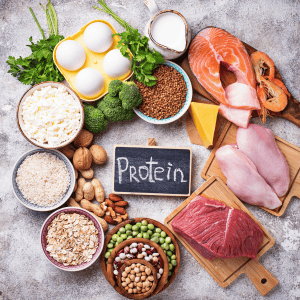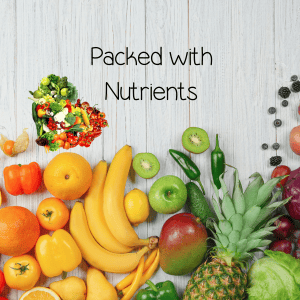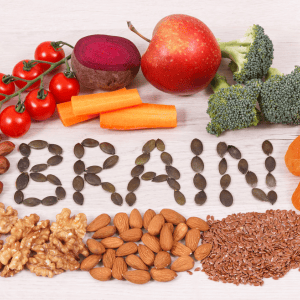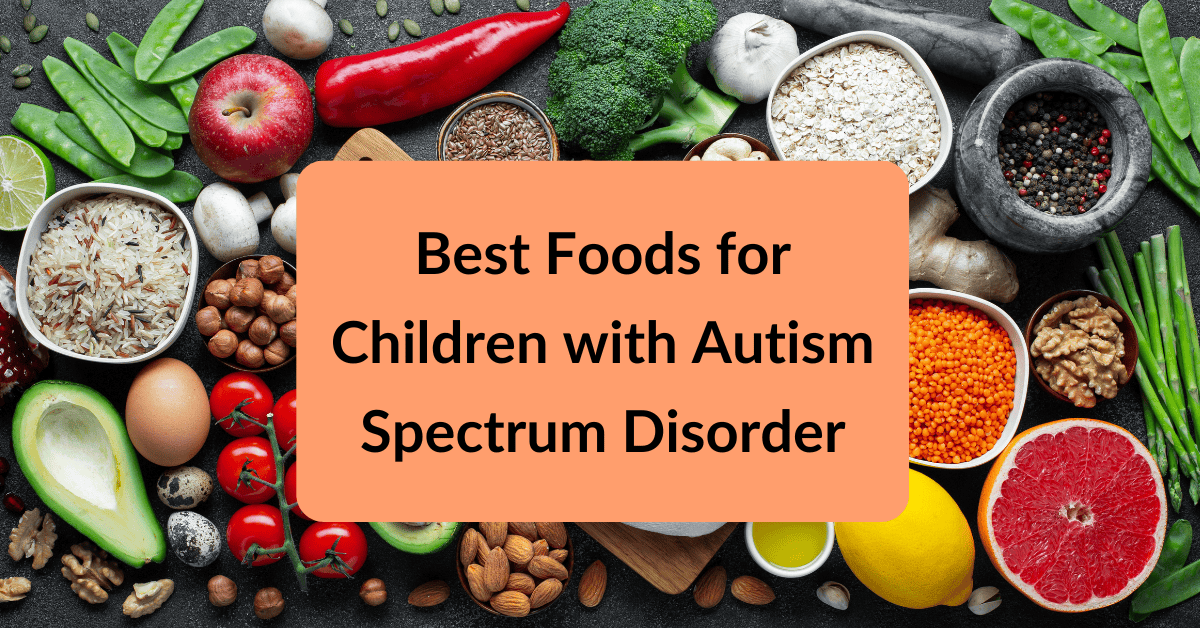Last updated on March 12th, 2025 at 07:59 am
The link between what we eat and how we feel has never been stronger, and for children on the autism spectrum, this connection can be especially pronounced.
Proper nutrition is not only vital for physical health but also plays a significant role in supporting cognitive function, and mood stability and managing common challenges associated with Autism Spectrum Disorder (ASD).
This guide is designed to help you understand the impact of diet on autism and offers a list of foods that can contribute to a balanced and beneficial eating plan for children on the autism spectrum.
Understanding Autism Spectrum Disorder (ASD)
Autism Spectrum Disorder (ASD) is a multifaceted neurological and developmental condition impacting an individual’s behavior, communication, learning, and social interactions.
It encompasses a range of hurdles such as struggles in social communication, repetitive actions, and heightened sensory responses.
Although the precise cause of autism remains unclear, investigations indicate a sophisticated blend of genetic and environmental influences.
Disclosure: There are affiliate links in this post. If you click the link and buy something, I might get a commission at no additional cost to you! This is what keeps this blog running so consider using these links if you decide to try any of my recommendations.
The Importance of Nutrition for Children with ASD
 Growing evidence supports the idea that a healthy diet may play an essential role in managing the symptoms of autism.
Growing evidence supports the idea that a healthy diet may play an essential role in managing the symptoms of autism.
Many children with ASD have unique nutritional needs and may be at a higher risk for certain nutritional deficiencies due to selective eating habits or challenges with digestion.
A balanced diet rich in specific nutrients has been linked to improvements in concentration, behavior, and overall cognitive function in children with autism.
Nutritional Considerations for Children with Autism
Before looking at specific foods, it’s essential to consider the typical nutritional concerns of children on the autism spectrum.
Children with ASD may have specific dietary sensitivities or intolerances, often related to gluten, casein, or certain food additives.
Addressing these unique needs by identifying and avoiding triggers is a pivotal first step in creating a supportive diet plan.
It’s also critical to recognize that many children with ASD may have difficulties with feeding, such as picky eating or food refusals, often linked to sensory processing challenges.
Consulting a nutritionist who specializes in autism can assist in creating a tailored eating plan that meets both nutritional requirements and sensory preferences.
Key Nutrients for Cognitive Function
For children with autism, focusing on certain nutrients is crucial for promoting optimal cognitive and behavioral development.
Nutrients like omega-3 fatty acids, vitamin D, and magnesium have been of particular interest because of their potential to support brain health.
Omega-3 Fatty Acids: Enhancing Brain Health
Research has suggested that omega-3 fatty acids—found in abundance in certain fish, nuts, and seeds—may have a positive impact on language and speech development, as well as hyperactivity and social behavior in children with autism.
Including these “good fats” in a child’s diet may aid in reducing inflammation in the brain and provide support for overall cognitive function.
Some foods high in omega-3s include salmon, sardines, walnuts, and flaxseeds.
Vitamin D: Supporting Development and Immunity
Vitamin D plays a critical role in immune function and helps the body absorb and use other essential nutrients.
Children with autism often have lower levels of vitamin D, possibly due to dietary restrictions or reduced sun exposure. Including vitamin D-rich foods or supplements can aid in supporting both cognitive development and overall health.
Some examples of vitamin D-rich foods include egg yolks, beef liver, and salmon.
Magnesium: Calming the Nervous System
Magnesium is a mineral that is crucial for regulating the nervous system.
Both children and adults with autism are more likely to suffer from magnesium deficiencies, which can contribute to anxiety, irritability, and sleep disturbances—symptoms commonly seen in individuals with ASD.
Foods high in magnesium, such as leafy green vegetables and nuts, can help in promoting a sense of calm and well-being.
Best Foods to Include in the Diet
Incorporating a wide variety of foods into a child’s diet is key to addressing nutritional deficiencies.
Here are some nutrient-dense options that can provide the essential vitamins, minerals, and healthy fats that children on the autism spectrum may need.
Proteins: Essential for Growth and Development
Protein is vital for growing bodies and developing brains. 
Protein sources like poultry, fish, and eggs are rich in high-quality amino acids, essential for synthesizing neurotransmitters that play a crucial role in regulating mood and cognitive functions.
Salmon: High in Omega-3s
Salmon is one of the best sources of omega-3 fatty acids, with benefits that extend to brain health, heart health, and reducing inflammation.
Integrating salmon into the diet can be particularly beneficial for children with ASD.
Chicken Liver: Rich in Iron and Vitamin A
Chicken liver is a powerhouse of nutrients, providing high levels of iron and vitamin A—both crucial for cognitive development.
Iron supports the transport of oxygen to the brain, while vitamin A contributes to healthy vision and immune function.
Lean Beef: Source of Zinc and B Vitamins
Zinc plays a role in neurotransmitter function and has been linked to behavior and attention.
Lean beef is an excellent source of zinc, as well as other B vitamins necessary for cell metabolism and energy production.
Colorful Fruits and Vegetables: Packed with Nutrients
 Fruits and vegetables of different colors offer a wide range of essential vitamins, minerals, and antioxidants.
Fruits and vegetables of different colors offer a wide range of essential vitamins, minerals, and antioxidants.
These plant-based foods can help support the immune system and protect the body against oxidative stress.
Blueberries: Antioxidant-Rich Superfood
Blueberries are known for their high levels of antioxidants, which can protect the brain from oxidative stress and aid in memory retention.
Including blueberries in the diet of a child with autism can help support overall brain health.
Spinach: High in Iron and Folate
Spinach is an excellent source of iron and folate, both vital for maintaining healthy blood and supporting cognitive function.
Spinach can be included in a variety of dishes, from smoothies to omelets, making it a versatile addition to meals.
While the inclusion of a diverse array of fruits and vegetables can greatly benefit children with autism by providing essential vitamins, minerals, and antioxidants, it’s important to consider the specific dietary needs of those who may be on a special diet focusing on removing oxalates or other sensitive foods.
Sweet Potatoes: Providing Vitamin A and Fiber
Sweet potatoes not only offer a sweet and savory taste but also pack a nutritional punch.
They’re high in vitamin A, important for vision and immune support, as well as fiber, which aids in digestion.
Healthy Fats: Essential for Brain Function
Including sources of healthy fats in a child’s diet can support brain health and cognitive function.
Foods like avocados, olive oil, and coconut oil provide these essential fats without the harmful effects associated with trans fats found in processed foods.
Avocado: Healthy Monounsaturated Fats
Avocado is an excellent source of monounsaturated fats, which are considered a “healthy” fat.
Avocados can be served on their own, spread on toast, or incorporated into smoothies for a creamy and nutritious boost.
Olive Oil: Rich in Antioxidants and Healthy Fats
Olive oil is a staple in the Mediterranean diet, known for being rich in antioxidants and monounsaturated fats.
It’s a great choice for cooking or as a dressing for salads.
Coconut Oil: Source of Medium-Chain Triglycerides (MCTs)
Coconut oil contains medium-chain triglycerides (MCTs), a type of fatty acid that can be easily metabolized for energy, potentially offering cognitive benefits.
While MCTs may not be suitable for all individuals, they can be introduced gradually to evaluate their impact on behavior and well-being.
Nuts and Seeds: Nutrient Powerhouses
Nuts and seeds are convenient and nutrient-dense snacks that can provide essential vitamins, minerals, and healthy fats.
They can be added to meals, and salads, or enjoyed on their own for a satisfying and nutritious treat.
Walnuts: Omega-3 Fatty Acids
Walnuts are one of the best plant-based sources of omega-3 fatty acids, which can support brain health and reduce inflammation.
A handful of walnuts can be a great addition to a child’s snack or meal.
Pumpkin Seeds: Zinc and Magnesium
Pumpkin seeds are rich in both zinc and magnesium, two minerals that are often deficient in children with autism.
Sprinkling pumpkin seeds on top of yogurt, oatmeal, or salads can offer a nutritional boost to their diet.
Chia Seeds: Omega-3s and Fiber
Chia seeds are an excellent source of omega-3 fatty acids and provide a good amount of fiber, which can support digestive health and satiety.
They can be soaked to create a pudding-like texture, added to baked goods, or sprinkled on top of smoothies.
Superfoods for Brain Health
 Certain foods have been labeled as “superfoods” due to their exceptional nutrient profiles and benefits for brain health. Including these superfoods in a child’s diet can maximize the potential for cognitive development and overall well-being.
Certain foods have been labeled as “superfoods” due to their exceptional nutrient profiles and benefits for brain health. Including these superfoods in a child’s diet can maximize the potential for cognitive development and overall well-being.
Bone Broth: Rich in Collagen and Minerals
Bone broth is made by simmering bones and connective tissues. It is rich in collagen, which supports gut health, and minerals that are essential for the body’s functions, including supporting brain health.
Berries: Packed with Antioxidants and Flavonoids
Berries of all kinds are rich in antioxidants and flavonoids, which can help to protect the brain from oxidative stress and improve cognitive function. They make for a delicious snack or a topping for yogurt and cereal.
Leafy Greens: Excellent Sources of Vitamins and Antioxidants
Leafy greens like kale, spinach, and collard greens are loaded with vitamins, minerals, and antioxidants. They’re a nutritional powerhouse, offering support for a healthy brain and body.
Fatty Fish: Rich in Omega-3 Fatty Acids
Fatty fish such as salmon, mackerel, and sardines are the best sources of omega-3 fatty acids, which are essential for brain health. Regular consumption of these fish can support cognitive development and reduce inflammation.
Turmeric: Contains Curcumin with Anti-Inflammatory Properties
Turmeric contains curcumin, a substance with powerful anti-inflammatory and antioxidant properties.
Including turmeric in the diet, either as a spice or in golden milk, can support brain health and reduce inflammation.
Eggs: Rich in Choline and Antioxidants
Eggs are a nutrient-dense food that provides choline, an essential nutrient for brain development.
They also contain antioxidants like lutein and zeaxanthin, which can protect the eyes and support overall health.
Additionally, eggs are a great source of high-quality protein, essential for muscle repair and growth.
Beets: Contain Nitrates for Improved Blood Flow to the Brain
Beets contain nitrates, compounds that can improve blood flow, including to the brain.
They’re also rich in antioxidants and can be included in a child’s diet through beet juices, salads, or roasted beet chips.
Closing Thoughts Optimizing Nutrition for Children with Autism Spectrum Disorder
When it comes to supporting children with Autism Spectrum Disorder, a focus on nutrition is an important piece of the puzzle.
By understanding the best foods for children with autism and how nutrients play in cognitive function, mood stabilization, and overall health, you can make informed choices to create a diet that supports the unique needs of your child.
Incorporating a variety of nutrient-dense foods, such as proteins, colorful fruits and vegetables, healthy fats, and superfoods, into your child’s eating plan can provide the foundation for improved well-being and potentially reduce the challenges they may face.
While there is no one-size-fits-all approach to nutrition for children with autism, this guide provides a starting point for exploring the many ways diet can positively impact the lives of children.
Additional Resource:
- Check Out My Storefront
- Autism and Food Allergies Symptoms, Types, and Remedies
- Picky Eating and Autism Spectrum
- Alternative treatments for Autism





0 Comments